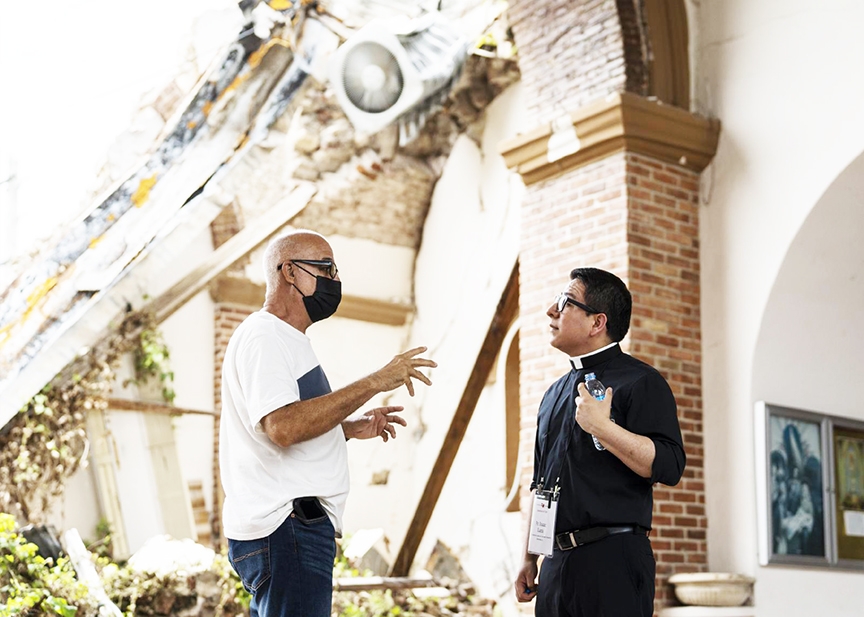
NEWARK, N.J. Deacon Asterio Velasco, director of Hispanic ministry for the Newark Archdiocese, is concerned about Puerto Rico.
How will it recover from Hurricane Fiona when so many buildings remain in need of major repair since back-to-back hurricanes hit the island five years ago?
Hurricanes Maria and Irma struck Puerto Rico in 2017, damaging more than 1,000 Catholic schools, churches and facilities – most of which still need to be remediated.
Then Fiona tore through Puerto Rico and other parts of the Caribbean as a Category 1 storm Sept. 18, leaving even more destruction and killing at least eight people.
Before Fiona, Deacon Velasco saw the situation in Puerto Rico firsthand this past summer as one of 20 Church leaders invited by Catholic Extension to visit the island to help communities still struggling with their recovery from the hurricanes, in addition to earthquakes in 2020.
Catholic Extension is a Chicago-based papal mission society that supports the work and ministries of U.S. mission dioceses.
Its mission trips, funded through the Lilly Endowment, aim to help Church leaders learn about the Catholic Church’s missionary activities.
For the deacon, visiting Puerto Rico was a homecoming of sorts. Born in Valladolid, Spain, he moved to Puerto Rico as a young man. There, along with studying, he worked in Salesian ministry “among the most humble in Cantera Santurce,” an area of San Juan.
Although he had lived and served in one of the poorest neighborhoods in Puerto Rico during that time, he said he was shocked during the mission immersion trip to the dioceses of Puerto Rico in seeing the hurricane damage five years after Maria blew through.
He was, however, mostly moved by the resiliency of people with “big hearts and joy,” who have waited patiently for their churches and missionary facilities to be rebuilt.
“We saw destroyed buildings, like the church of Immaculate Conception in Guayanilla with fallen walls and bells on the ground, with the altar covered with a tarp and plywood, and Christmas decorations still scattered as they were on Jan. 7, 2020,” Deacon Velasco said in a Sept. 20 interview with Jersey Catholic, the news outlet of the Newark Archdiocese.
But next to the church in ruins is a makeshift church with the altar and the chairs under a tarp. It is a temporary place for a community that hopes to celebrate the Eucharist again in its centennial church.
“I was impressed that after five years, the faithful keep coming back to Mass under the tarp, waiting for their church to be rebuilt,” Deacon Velasco said.
Now he’s worried over the damage Fiona has brought to the people of Puerto Rico. Church officials there reported massive flooding and wind damage and thousands of homes and businesses lacked power and water.
“In recent days we have all been able to see on the television screens the images of the devastation that Hurricane Fiona caused in Puerto Rico,” Deacon Velasco said.
“The great floods have done a lot of damage and have left much of the island without electricity and without water service,” he said. “Unfortunately, these are images that have been repeated in recent years on the island.”
During his three-day visit, Deacon Velasco served at a Mass celebrated at the Protomartyrs Parish of the Immaculate Conception in Aguada, where five friars were martyred in the 1500s, and he visited with children at the Santa Teresita del Niño Jesus Children’s Home built by Catholic Extension.
In August, construction bids went out for the first 30 of nearly 1,000 Catholic facilities to be rebuilt in Puerto Rico through Catholic Extension’s multi-diocesan recovery program, according to Joe Boland, vice president of missions at Catholic Extension.
The program received $90 million to remediate the earthquake and hurricane damage and an additional $50 million to build more resilient church structures to withstand the next storm.
Boland said that the delay in funding and rebuilding was due to many factors, mainly “bureaucratic delays on the part of various government agencies involved” and the pandemic shutdown. Many church buildings are also historical, some as old as 500 years, requiring more oversight.
“But the patience and perseverance of so many of our pastors, bishops, and partners will hopefully begin to be rewarded as church buildings begin to be rebuilt and the government continues to obligate funding to more damaged churches,” Boland said before Fiona hit the island.
He said that as of Sept. 19, they were just beginning to assess the situation after Fiona.
On Sept. 21, President Joe Biden approved a disaster declaration for Puerto Rico, authorizing federal recovery funds through the Federal Emergency Management Agency.
Catholic Extension’s recovery team will work with FEMA to identify damage to Catholic properties caused by Hurricane Fiona that may be eligible for repair funding under its public assistance program.
“The purpose of the trip was to make us aware of the reality faced by many Puerto Rican Catholic communities and the way Catholic Extension helps them,” Deacon Velasco said.
“And to show us that, in the midst of the material challenges they face,” he added, “the Puerto Rican people are a people who maintain hope and joy because it is a people of great faith who manifest great love for our Mother, Our Lady of the Divine Providence.”









